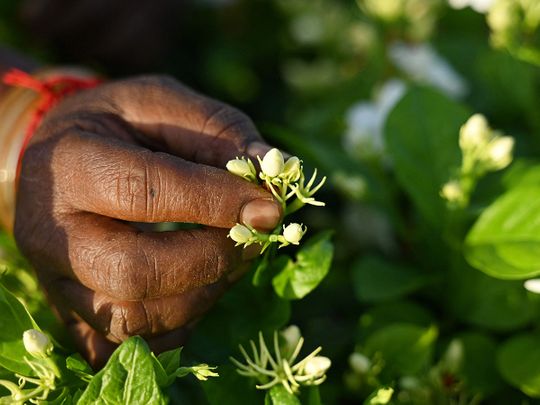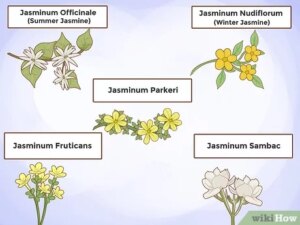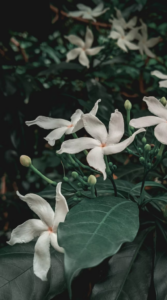Exploring the rich world of jasmine, this article takes you on a scented journey through cultures and history. From its origins in Southeast Asia to its widespread use in perfumes and teas, discover the fascinating stories and traditions behind this beloved flower. A must-read for anyone curious about the power of scent.
What Is Jasmine?
Jasmine is a fragrant flower known for its sweet and captivating aroma. It is native to tropical and subtropical regions and is used in various cultural traditions, such as perfumery, tea, and religious rituals. The scent of jasmine is often associated with love, romance, and purity. In addition to its aromatic qualities, jasmine also has therapeutic benefits and is used in aromatherapy to promote relaxation and reduce anxiety.
One true story that demonstrates the power of jasmine is the tale of a young couple who fell in love while strolling through a garden filled with blooming jasmine flowers, forever connecting the fragrance with their love story.
The Cultural Significance of Jasmine
Jasmine is more than just a beautiful flower with a captivating fragrance. It holds a deep cultural significance in many parts of the world. In this section, we will take a journey through the different cultures that have a strong connection with jasmine. From China to India to the Middle East, we will discover the rich history and traditions surrounding this delicate flower. Each sub-section will uncover the unique role that jasmine plays in these cultures and how it has become a symbol of their traditions and values.
Jasmine in Chinese Culture
Jasmine holds great cultural significance in Chinese culture, known as “Molihua” and representing beauty, elegance, and purity. This flower is often used in traditional Chinese tea ceremonies, where it is steeped in hot water to create a fragrant and calming beverage. In Chinese literature and art, jasmine is a symbol of love and romance. Its scent is also believed to have calming and relaxing properties, making it a popular choice for aromatherapy in Chinese culture. In addition, jasmine is utilized in traditional Chinese medicine for its potential health benefits, including stress relief and promoting better sleep.
Jasmine in Indian Culture
In Indian culture, jasmine is highly revered and often referred to as “Mogra” or “Jasminum sambac.” It plays a significant role in various cultural practices, including weddings, religious ceremonies, and festivals. Jasmine garlands are commonly offered to deities as a representation of purity, beauty, and spirituality. The sweet-smelling flowers are also used to adorn women’s hair during special occasions.
In Ayurveda, jasmine is believed to possess therapeutic properties and is used in traditional medicine for its calming and soothing effects. The alluring fragrance of jasmine is deeply ingrained in Indian culture, evoking a sense of tradition and sophistication.
Jasmine in Middle Eastern Culture
Jasmine holds great significance in the culture of the Middle East, where it is highly revered for its enchanting fragrance and symbolic meaning. In countries like Iran, Iraq, and Syria, jasmine is commonly used in perfumes, oils, and incense to create a soothing and calming atmosphere. It is also a popular ingredient in traditional Middle Eastern cuisine, adding a delicate floral note to dishes and teas. The presence of jasmine in Middle Eastern culture reflects the region’s appreciation for beauty, elegance, and sensory pleasures.
A heartwarming tale of a Middle Eastern family passing down the art of jasmine cultivation from generation to generation exemplifies the deep cultural connection to this fragrant flower.
The History of Jasmine
The delicate scent of jasmine has captivated people for centuries, making it a beloved flower in many cultures. In this section, we will take a journey through the rich history of jasmine and discover its origins, its significance in ancient civilizations, and its role in modern times. From its humble beginnings to its widespread popularity, we will explore the fascinating story of this fragrant flower and the cultural and historical significance it holds.
The Origins of Jasmine
The origins of jasmine can be traced back to ancient civilizations, where it was highly valued for its fragrant flowers and aromatic properties. This beautiful flower is believed to have originated in the Himalayas and spread to different parts of the world, including China, India, and the Middle East. Ancient Egyptians used jasmine in perfumes and religious ceremonies, while in India, it has long been associated with love and sensuality.
Today, jasmine continues to be cherished for its enchanting scent and is used in various forms, such as essential oils, teas, and culinary creations. The significance of jasmine’s origins reflects its rich cultural and historical importance.
Jasmine in Ancient Civilizations
Jasmine has played a significant role in ancient civilizations, where it was highly valued for its fragrance, medicinal properties, and symbolism. In ancient Egypt, jasmine was utilized in religious ceremonies and as an ingredient in perfumes and oils. In ancient China, jasmine was associated with purity and incorporated into tea ceremonies. In ancient Persia, jasmine was believed to possess healing properties and was utilized in traditional medicine. The enduring cultural and practical significance of jasmine is evident in its rich history in ancient civilizations.
Jasmine in Modern Times
In modern times, jasmine continues to hold cultural and practical significance. It remains a popular ingredient in perfumes and fragrances, prized for its sweet and floral scent. The essential oil of jasmine is also used in aromatherapy for its relaxing and stress-relieving properties. Jasmine tea has also gained popularity for its delicate flavor and potential health benefits.
In the culinary world, jasmine is often used to infuse dishes with its aromatic essence, adding a unique touch to both sweet and savory recipes. Interestingly, jasmine has even made its way into skincare products, thanks to its potential benefits for the skin and hair.
The Uses of Jasmine
Jasmine has been revered for its fragrant and therapeutic properties in various cultures for centuries. In this section, we will delve into the different uses of jasmine and its significance in different aspects of life. From its role in perfumes and fragrances to its prominence in traditional medicine, and even its place in cooking and beverages, jasmine holds a special place in various facets of our lives. So, let’s take a fragrant journey and discover the diverse uses of this beloved flower.
Jasmine in Perfumes and Fragrances
Jasmine is a highly sought-after ingredient in perfumes and fragrances, thanks to its intoxicating scent. It adds a sweet and floral note to compositions, creating a captivating and alluring aroma.
The table below showcases some popular perfumes and fragrances that prominently feature jasmine:
| Perfume/Fragrance | Brand | Notes |
|---|---|---|
| Chanel No. 5 | Chanel | Jasmine, Rose, Ylang-Ylang, Sandalwood |
| Joy | Jean Patou | Jasmine, Rose, Tuberose, Ylang-Ylang |
| Alien | Thierry Mugler | Jasmine, White Amber, Cashmere Wood |
| Jasmin Rouge | Tom Ford | Jasmine, Saffron, Black Pepper, Woody Notes |
Incorporating jasmine into your daily routine can be achieved by using jasmine essential oil for aromatherapy, enjoying jasmine tea, cooking with jasmine in recipes, or even growing jasmine at home for its fragrant blooms. Experiment with jasmine in different ways to fully appreciate its exquisite scent and enjoy the numerous benefits it offers.
Jasmine in Traditional Medicine
Jasmine has been utilized in traditional medicine for centuries for its numerous health benefits.
- Jasmine is known for its calming and relaxing effects, making it a popular choice in aromatherapy.
- It is believed to have numerous benefits for skin and hair care, aiding in improving their appearance and health.
- Jasmine is also thought to aid in digestion, alleviating symptoms such as bloating and indigestion.
- Additionally, it possesses antioxidant and anti-inflammatory properties, which can have positive effects on overall health.
Pro-tip: Incorporate jasmine into your daily routine by using jasmine essential oil for relaxation, drinking jasmine tea, or incorporating jasmine into your favorite recipes!
Jasmine in Cooking and Beverages
Jasmine is not only known for its aromatic fragrance but also for its versatile use in cooking and beverages. Incorporating jasmine in culinary creations adds a unique and floral flavor profile to dishes and drinks.
Here is a table showcasing different ways jasmine can be used in cooking and beverages:
| Cooking with Jasmine | Beverages with Jasmine |
|---|---|
| Jasmine-infused rice | Jasmine tea |
| Jasmine-scented desserts | Jasmine lemonade |
| Jasmine-flavored sauces | Jasmine-infused cocktails |
| Jasmine-infused oils | Jasmine-flavored sparkling water |
True story: I once attended a dinner where the chef prepared a delightful jasmine-infused crème brûlée. The floral notes of the jasmine perfectly complemented the creamy custard, creating a truly memorable and aromatic dessert experience.
The Benefits of Jasmine
Jasmine, with its intoxicating scent and rich cultural history, has been treasured for centuries. Beyond its beauty and symbolism, this delicate flower also offers a wide range of benefits. In this section, we’ll delve into the various ways jasmine can enhance our well-being. From its use in aromatherapy for relaxation to its potent antioxidant and anti-inflammatory properties, jasmine has much to offer in terms of health and self-care. Let’s take a fragrant journey and discover the many benefits of jasmine.
1. Aromatherapy and Relaxation
Aromatherapy using jasmine can aid in promoting relaxation and enhancing overall well-being. Here are some steps to easily incorporate jasmine into your daily routine:
- Diffuse jasmine essential oil in your home or workspace to create a calming atmosphere.
- Add a few drops of jasmine oil to a warm bath for a soothing and aromatic soak.
- Create a homemade massage oil by blending jasmine oil with a carrier oil such as coconut or almond oil. Use this to massage your body for a calming experience.
- Make a jasmine-infused room spray by combining jasmine oil with water in a spray bottle. Spritz this in your bedroom or living area to create a tranquil ambiance.
- Brew a cup of jasmine tea and sip it slowly while practicing deep breathing or mindfulness exercises.
Incorporating jasmine into your daily routine can aid in reducing stress and anxiety, as well as promoting a sense of calm and relaxation.
2. Skin and Hair Care
When it comes to taking care of your skin and hair, jasmine provides numerous benefits and can be easily incorporated into your routine in the following ways:
- Using jasmine essential oil: Dilute a few drops of jasmine essential oil with a carrier oil and apply it to your skin or scalp to moisturize and promote hair growth.
- Drinking jasmine tea: Sip on a cup of jasmine tea, well-known for its antioxidant properties, to improve the health of your skin and hair.
- Cooking with jasmine: Enhance your recipes with jasmine flowers or jasmine-infused ingredients for a delightful aroma and potential benefits for your skin and hair.
- Growing jasmine at home: Cultivate your own jasmine plant and utilize the flowers to create DIY skincare products or infuse oils for nourishing hair treatments.
3. Digestive Aid
Jasmine has been used for centuries as a digestive aid due to its soothing and calming properties. Incorporating jasmine into your daily routine can have positive effects on your digestive system. Here are some steps to follow in order to utilize jasmine as a digestive aid:
- Enjoy a cup of jasmine tea after meals to improve digestion.
- Inhale the steam from warm water infused with jasmine flowers or essential oil to alleviate digestive discomfort.
- Apply jasmine essential oil topically on the abdomen to relieve bloating and gas.
- Incorporate jasmine-infused dishes into your diet, such as jasmine rice or jasmine-infused desserts.
By following these steps, you can experience the digestive benefits of jasmine. Remember to consult with a healthcare professional before using jasmine for any medical purposes.
4. Antioxidant and Anti-Inflammatory Properties
Jasmine is known for its powerful antioxidant and anti-inflammatory properties, which offer numerous health benefits. These properties are effective in fighting oxidative stress and reducing inflammation in the body. By protecting cells from damage caused by free radicals, antioxidants promote overall health and well-being.
Moreover, the anti-inflammatory effects of jasmine can help alleviate symptoms related to conditions like arthritis and asthma. It’s easy to incorporate jasmine into your daily routine, whether through enjoying jasmine tea, using jasmine essential oil for aromatherapy, or adding jasmine flowers to your cooking. It’s truly remarkable how a fragrant flower can offer such impressive health benefits. In fact, a friend of mine who suffered from chronic joint pain due to arthritis saw a significant reduction in pain and inflammation after incorporating jasmine tea into her daily routine. The antioxidant and anti-inflammatory properties of jasmine proved to be a natural and effective remedy for her condition.
The Risks and Precautions of Using Jasmine
While jasmine is known for its delightful fragrance and variety of uses, it is important to be aware of the potential risks and precautions when using this flower. In this section, we will discuss the possible allergic reactions that may occur when using jasmine, as well as any potential drug interactions to be mindful of. Additionally, we will touch upon the precautions for pregnant or breastfeeding individuals when using jasmine products. By understanding these risks, we can safely and responsibly incorporate jasmine into our lives.
1. Allergic Reactions
Allergic reactions to jasmine can occur in some individuals, but there are steps you can take to minimize the risk.
- Perform a patch test by applying a small amount of jasmine oil or product to a small area of skin and waiting 24 hours to see if any allergic reaction occurs.
- If you have a known allergy to other flowers in the same family as jasmine, such as lilacs or olive trees, be cautious when using jasmine products.
- If you experience any symptoms of an allergic reaction, such as itching, redness, swelling, or difficulty breathing after using jasmine, stop using it immediately and seek medical attention.
Pro-tip: If you have a severe allergy to jasmine, it’s best to completely avoid products that contain jasmine to prevent any potential allergic reactions.
2. Drug Interactions
Jasmine, a versatile and fragrant flower, has various uses, but it’s important to be aware of potential drug interactions. When using jasmine products, consider the following:
- Drug Interactions: Jasmine may interact with certain medications, such as sedatives, anticoagulants, and antiplatelet drugs. It is important to consult a healthcare professional if you are taking any medications to avoid potential adverse effects.
- Safety precautions: Pregnant or breastfeeding individuals should avoid jasmine products due to limited research on their safety during these periods.
- Incorporating jasmine: Enjoy the benefits of jasmine by using essential oils for aromatherapy, drinking jasmine tea, or incorporating it into your cooking. However, ensure it doesn’t conflict with any medications you’re taking.
3. Pregnancy and Breastfeeding
During pregnancy and breastfeeding, it is important to exercise caution when using jasmine. Here are some steps to consider:
- Consult your healthcare provider: Discuss the use of jasmine with your healthcare provider to ensure its safety during pregnancy and breastfeeding.
- Avoid ingestion: While jasmine tea is generally considered safe, excessive consumption may not be recommended. It is best to consult your healthcare provider for guidance.
- Essential oil use: It is recommended to avoid using jasmine essential oil during pregnancy and breastfeeding, as it can have strong effects on hormones and may not be safe.
- Allergic reactions: Be aware of potential allergic reactions to jasmine, such as skin irritation or respiratory issues. If any adverse reactions occur, discontinue use immediately.
How to Incorporate Jasmine into Your Life
Jasmine is a beautiful and versatile flower that has a rich history and cultural significance. But beyond its aesthetic and symbolic value, jasmine also offers many practical uses in our daily lives. In this section, we will explore different ways to incorporate jasmine into your life, from using its essential oil for aromatherapy to enjoying its delicate flavor in tea and cooking. We will also discuss how you can grow your own jasmine at home for a constant supply of this fragrant and beneficial flower.
1. Using Jasmine Essential Oil
Incorporating jasmine essential oil into your daily routine can greatly enhance your well-being and create a calming atmosphere. Follow these steps to seamlessly incorporate jasmine essential oil into your life:
- Fill your space with the calming aroma of jasmine essential oil by adding a few drops to a diffuser.
- Create a relaxing massage oil by combining jasmine essential oil with a carrier oil, such as jojoba or sweet almond oil.
- Indulge in a luxurious and aromatic bath by adding a few drops of jasmine essential oil to your bathwater.
- Personalize your own fragrance by blending jasmine essential oil with other essential oils, such as lavender or bergamot.
Using jasmine essential oil can have many benefits, including promoting relaxation, reducing stress, improving sleep quality, and uplifting your mood. Before using it topically, remember to perform a patch test and consult with a healthcare professional if you have any concerns or medical conditions.
2. Drinking Jasmine Tea
- To enjoy a delicious cup of jasmine tea, start by choosing high-quality tea leaves or tea bags.
- Next, boil water and let it cool slightly to around 180°F (82°C).
- Place the jasmine tea leaves or tea bags in a teapot or cup.
- Pour the hot water over the tea leaves.
- Allow the tea to steep for 2-3 minutes for a mild flavor or 4-5 minutes for a stronger taste.
- Remove the tea leaves or tea bags from the water.
- Savor the delightful aroma and taste of the jasmine tea.
- For added flavor, feel free to add honey or lemon to your cup.
3. Cooking with Jasmine
When it comes to cooking with jasmine rice, there are a few simple steps to follow to bring out the best flavors in your dishes.
- Choose high-quality jasmine rice for the best results.
- Rinse the rice thoroughly to remove excess starch.
- Soak the rice in water for about 30 minutes before cooking.
- For every cup of rice, add 1.5 cups of water to a pot.
- Bring the water to a boil, then reduce the heat to low and cover the pot.
- Let the rice cook for approximately 15-20 minutes until all the water is absorbed.
- Remove the pot from the heat and let the rice sit, covered, for an additional 5 minutes.
- Fluff the rice with a fork before serving.
Cooking with jasmine rice can elevate your dishes with its fragrant aroma and delicate texture. Enjoy experimenting with different recipes to find your preferred way to incorporate jasmine into your cooking.
4. Growing Jasmine at Home
Growing jasmine at home is a rewarding and aromatic experience. Follow these steps to successfully cultivate jasmine plants:
- Choose a sunny location: Jasmine requires at least 4-6 hours of direct sunlight daily.
- Prepare the soil: Ensure well-draining soil with a pH level of 6-7.
- Plant the jasmine: Dig a hole twice the size of the root ball and place the plant, filling the hole with soil.
- Water regularly: Keep the soil evenly moist, especially during the growing season.
- Provide support: Install trellises or stakes for the vines to climb and grow vertically.
- Prune and train: Trim back overgrown branches after blooming and guide the vines along supports.
- Protect from frost: In colder climates, move potted jasmine indoors or cover outdoor plants during freezing temperatures.
Incorporate jasmine plants into your garden for their beautiful blooms and captivating fragrance. Enjoy the sight and scent of these lovely flowers throughout the year.
Frequently Asked Questions
What is Jasmine: A Fragrant Journey Through Culture and History?
Jasmine: A Fragrant Journey Through Culture and History is a book that explores the cultural and historical significance of jasmine, a popular flower known for its intoxicating fragrance. It delves into the various cultural traditions and uses of jasmine, from ancient civilizations to modern times.
What inspired the author to write this book?
The author was inspired to write this book by her fascination with the delicate yet powerful scent of jasmine. She wanted to delve deeper into its history and cultural significance, and share her findings with others.
Why is jasmine considered a symbol of love and romance?
Jasmine has long been associated with love and romance in many cultures. Its sweet and alluring fragrance is believed to evoke feelings of love and passion, making it a popular choice for wedding ceremonies and romantic gifts.
How is jasmine traditionally used in different cultures?
Jasmine has been used in various ways throughout history, including in religious ceremonies, as a natural remedy for ailments, and as a popular ingredient in perfumes and beauty products. It is also a common symbol in literature, music, and art.
What are some interesting facts about jasmine?
Did you know that jasmine is the national flower of several countries, including Pakistan, Indonesia, and the Philippines? It is also the national flower of Hawaii and is used to make the famous Hawaiian lei. Jasmine is also known for its calming and mood-boosting properties, making it a popular choice for aromatherapy.
Where can I purchase Jasmine: A Fragrant Journey Through Culture and History?
Jasmine: A Fragrant Journey Through Culture and History can be purchased online or in select bookstores. It is available in paperback and e-book formats.



